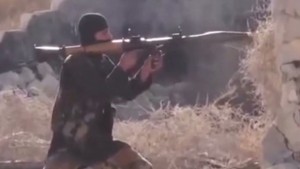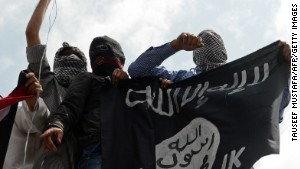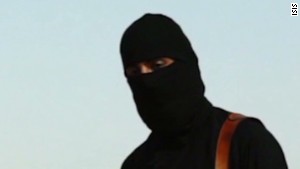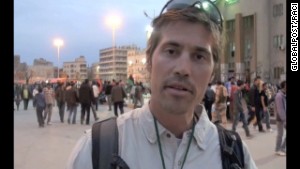Isis Islamic terrorist organization killed an American journalist isis We condemn terrorists.
you can clikc here cnn
-journalist-james-foley-isis-beheading.cnn.
New York (CNN) -- When war reporter James Foley wasn't writing for GlobalPost or recording video for AFP or appearing on the PBS "NewsHour," he occasionally shared stories on his own blog, aptly titled "A World of Troubles."
For a subtitle, he chose the famous Carl von Clausewitz sentence "War is fought by human beings."
And that is exactly what Foley sought to show with his reporting: humanity amid the horror of war.
Foley was abducted while on a reporting trip in northern Syria in November 2012. He was never heard from again.




A video published Tuesday by the extremist group ISIS showed Foley being beheaded. It is not known when or where the video was recorded.
For Foley's family and friends, the recording was the answer they hoped they'd never hear to their questions about his disappearance.
"We have never been prouder of our son Jim. He gave his life trying to expose the world to the suffering of the Syrian people," his mother, Diane, said Tuesday night,
She called him "an extraordinary son, brother, journalist and person."
Courageous, generous
Foley was the oldest child of Diane and John Foley of Rochester, New Hampshire. He had four siblings.
Foley -- Jim to his friends -- had been reporting from war-torn countries for the better part of four years when he disappeared in Syria.
On Tuesday, fellow journalists remembered him for his courage and his generosity.
One of his friends, Alex Sherman of Bloomberg News, wrote on Twitter that he was a "funny, warm, Big Lebowski-loving guy."
Another friend, Max Fisher of Vox, praised his "dedication to truth and understanding."
Fisher also wrote that "Jim's faith was something we all agreed not to discuss publicly while he was held in Syria, but it was the wellspring of his generosity,"
He recalled how Foley helped to organize a memorial fund for a photographer, Anton Hammerl, who was killed in Libya in 2011.
Foley had been traveling with Hammerl and two other journalists at the time, and the three who survived wound up in a Libyan jail.
Front-line journalist
Foley was freed six weeks later. Afterward, in a video interview with the Boston Globe, he hesitated to make the story about himself, remarking at one point that "you don't want to be defined as 'that guy who got captured in 2011.'"
"I believe that front-line journalism is important, you know -- without these photos and videos and first-hand experience, we can't really tell the world how bad it might be," he said.
One of the journalists detained with Foley in Libya, Clare Morgana Gillis, said his fundraising for Hammerl's family was "the same impulse that compelled him to cut short his much-needed break from reporting in Syria when a colleague went missing last summer, and to raise money for an ambulance for Aleppo's Dar al-Shifa field hospital, where he spent weeks filming the plight of doctors who struggled to save lives with minimal space equipment."
His time as a teacher
For Foley, these were acts of service, not entirely unlike his time spent in the Teach for America program. He began teaching in Phoenix in 1996.
"He'd promise students that he'd take them to the Castles and Coasters amusement park if they would come to class everyday," a fellow Teach for America alum, Sarah Fang, recalled in an essay in 2013.
Foley later "taught reading and writing to inmates at the Cook County Sheriff's Boot Camp in Chicago," according to a Columbia Journalism Review feature about him.
His journalism career
In the mid-2000s he decided to pursue a journalism career, first by enrolling at Northwestern University's well-respected Medill School of Journalism and then by embedding with American troops in Iraq and Afghanistan. While preparing for his first embed, he started his blog.
Foley freelanced for a number of news media outlets, including GlobalPost, a world news Web site founded in 2009.
In 2012, he gravitated toward the spiraling conflict in Syria.
Fang, who kept in touch with Foley after their years teaching in Phoenix, wrote that his interest in the story there did not surprise her.
"He's always been willing to step into a zone where no one else wants to go," she wrote. "Jim feels that society needs reporters willing to bear witness and report back the facts of history-in-the-making. And his loyalty to his colleagues meant that he wanted to be there with them on the frontlines."
BuzzFeed Middle East correspondent Sheera Frenkel said she last saw Foley about a week before his final trip into Syria.
Drinking beers at the lobby of a hotel popular among journalists, they talked, she said, about "how hard it was to move on from this job, into a life which would allow for marriage and family."
"He was a generous colleague, never holding back a tip, phone number, or detail that could help, and could spend hours talking over the ins and outs of a story to get it just right," Frenkel wrote in an email message.
"Jim was a great journalist, and I think he'd like to be remembered that way, first and foremost."
After the news of Foley's killing spread on Tuesday, CBS News foreign correspondent Clarissa Ward changed her profile picture on Twitter to a photo of Foley wearing a helmet, a flak jacket and holding up a camera.
This, she said, "is how I will chose to remember James -- as a brave and tireless journalist with a passion for the Syrian cause."
























.jpg)





















































.jpg)

Inga kommentarer:
Skicka en kommentar